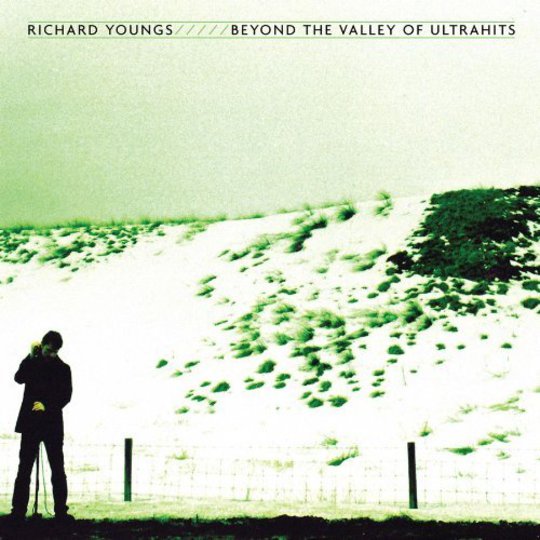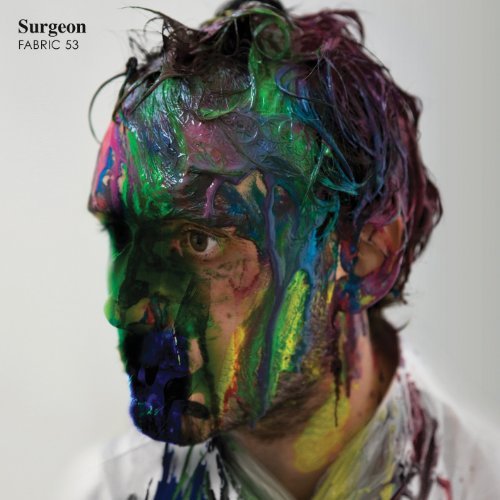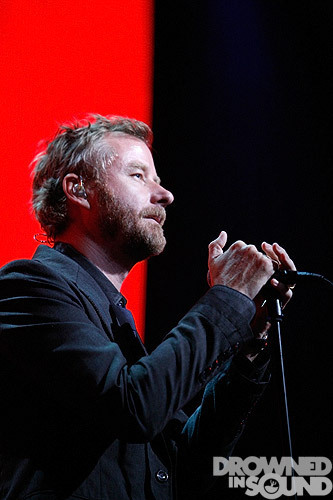Richard Youngs is a name not readily associated with hits, be they of the 'Ultra' variety or otherwise. In fact Youngs isn't a name likely bring any associations to mind for the vast majority of music lovers, such is the man's obscurity. The Hertforshire-born, but long term Glasgow-based, artist has an extensive, but little heard back catalogue of solo work and collaborations (with such household names as Jandek and Matthew Bower) spanning from the early Eighties to the present. He also rarely performs live, particularly outwith Glasgow, although a 2002 tour in support of Low and an appearance at Thurston Moore's ATP in 2006 are amongst the rare exceptions. Musically he has little concern for genre classifications, but Beyond the Valley of the Ultrahits is Young's response to a dare from friend and collaborator Andrew 'Paz' Paine to 'Make a proper pop album.'
What makes a 'proper' pop album? Is it melodic immediacy? Shiny production value? A snapshot of the zeitgeist? Mainstream acceptance, even? You probably don't need me to tell you that Beyond the Valley of the Ultrahits doesn't exactly tick all of these boxes. Youngs himself stated that he intended to capture the 'beats and hooks' of contemporary pop. Even this seems a bit of a stretch, but this is a minor concern when assessing whether the album is actually any good, because as it turns out it, it is rather good. In fact it's also sort of 'pop', in way that we consider the likes of Caribou to be pop, albeit qualified by a prefix.
Delightful album opener 'The Valley In Flight' would in fact sound quite at home on Caribou's Swim with its relentless bell chimes, gently throbbing bass and fizzy bustle of pinging beats and clicks paddling in a pool of aqueous organ drones, which prove to be a almost ever-present throughout the record. They help to establish the gentle boat-in-dock sway of the following track 'Like a Sailor'. It has similar make-up to the album opener, but this is forgivable since it is the perfect accompaniment for Youngs to ponder "Are we all mariners of an ocean past?". The busy looped beats and percussion which are utilised throughout the record avoid foot-to-the-floor rhythms, instead fidgeting restlessly (occasionally straying out of time) so that when Youngs sings in his folky lilt of "Making ships and bottles for posterity" his voice is the most tangible presence, the rest of the music sounding like it could dissolve into the ether at any moment. The relative minimalism doesn't always make for the most immediately arresting melodies, and often it is up to Youngs' vocals themselves to provided the real hooks as on the harmonies of 'Love In the Great Outdoors', although matched with the looped beats and spare instrumentation has some hypnotic results, nowhere more so than on the short but spacious 'Still Life In Room'. Not exactly the 'hooks and beats' of contemporary pop, but engaging nonetheless.
The track which is most likely to engage casual listeners (or pop fans) is the majestic and anthemic 'Collapsing Stars'; it would be easy to imagine it in the hands of someone like Frightened Rabbit, with reverb-laden guitar and a real string section replacing the lo-fi swirl of synth, organ and drum loops, although they do the job beautifully...that is until a brief appearance of squalling metallic guitar which briefly threatens to derail the whole song. Unfortunately this hamfisted electric guitar rears it head several times on the record and is perhaps indicative of an individual used to indulging his own musical whims. As the record progresses a familiar sonic template emerges, which while it doesn't exactly scream CONTEMPORARY POP MUSIC, still proves fertile territory.
'Oh Reality' benefits from having a more straight forward and increasingly forceful beat as the vocal harmonies display a David Byrne-esque gospel fervour, whilst 'Radio Innocents' is an altogether denser affair, which the chugging guitar buried beneath the eerie organ drones redolent of TV On the Radio at their most snarling. The only bold departure is the loosely wound jangle-pop of 'Summer Void' which is possessed of an irresistible Astral Weeks like lushness. The funereal plod of closer 'Sun Points At the World' is another welcome departure in terms of pacing at least, Youngs still utilising the same range of sounds as the rest of the record, but the near-atonal bleeps are an appropriate backing for Youngs who sounds like he's orbit himself as he sings about how "The planets are turning" and "The sun points at the world".
So a contemporary pop album? Nah, the closest it gets to sounding like the mainstream is one song's resemblance to TV On the Radio. Regardless of its creators intent, however, the result is an interesting and strange little record that is instantly likeable, yet unmistakably the output of someone most comfortable working in the realm of the avant garde.
To celebrate the release of Beyond The Valley Of Ultrahits, Richard Youngs will perform a very special, double-edged set at London's Luminaire on Sunday July 25. Half of the evening will be a set of 'greatest hits' from his glorious catalogue, and the second half will feature a performance of Beyond The Valley Of Ultrahits in its entirety. This is not to be missed if you are within a continent or two of London. Tickets are available HERE.
DiS has two tickets to give away to a lucky reader; to win, post below with the name of the most exotic fruit or vegetable you can think of. Best one wins.
-
7Neil Ashman's Score






















